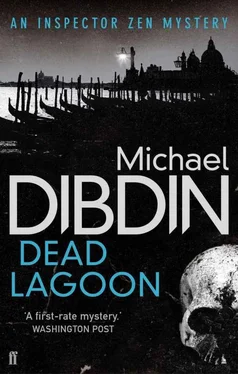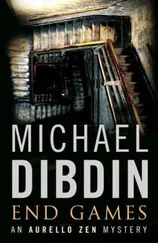Michael Dibdin - Dead Lagoon
Здесь есть возможность читать онлайн «Michael Dibdin - Dead Lagoon» весь текст электронной книги совершенно бесплатно (целиком полную версию без сокращений). В некоторых случаях можно слушать аудио, скачать через торрент в формате fb2 и присутствует краткое содержание. Жанр: Полицейский детектив, на английском языке. Описание произведения, (предисловие) а так же отзывы посетителей доступны на портале библиотеки ЛибКат.
- Название:Dead Lagoon
- Автор:
- Жанр:
- Год:неизвестен
- ISBN:нет данных
- Рейтинг книги:5 / 5. Голосов: 1
-
Избранное:Добавить в избранное
- Отзывы:
-
Ваша оценка:
- 100
- 1
- 2
- 3
- 4
- 5
Dead Lagoon: краткое содержание, описание и аннотация
Предлагаем к чтению аннотацию, описание, краткое содержание или предисловие (зависит от того, что написал сам автор книги «Dead Lagoon»). Если вы не нашли необходимую информацию о книге — напишите в комментариях, мы постараемся отыскать её.
Dead Lagoon — читать онлайн бесплатно полную книгу (весь текст) целиком
Ниже представлен текст книги, разбитый по страницам. Система сохранения места последней прочитанной страницы, позволяет с удобством читать онлайн бесплатно книгу «Dead Lagoon», без необходимости каждый раз заново искать на чём Вы остановились. Поставьте закладку, и сможете в любой момент перейти на страницу, на которой закончили чтение.
Интервал:
Закладка:
But where Zen’s father was a dominating absence, celebrated at every turn by stilted sepia photographs of a figure whose third dimension increasingly seemed as hypothetical as the existence of an afterlife, Silvio Morosini was one of a crowd of unequivocally real presences jostling and clamouring for attention in the household of which he was the nominal head. In fact this position was filled by his wife Rosalba, who had been Giustiniana Zen’s closest friend long before her marriage and was not about to desert her and the fatherless only child now that Rosalba’s prediction that the union in question would come to no good had, God forbid, come true.
The result had been that Aurelio had grown up treating the Morosini house more or less as his own, and had often taken advantage of this freedom to escape from the intolerable spectacle of his mother weeping silently as she went about her work. The quarrels in Silvio’s and Rosalba’s home were frequent, open and vociferous, shows in which anyone present was expected to join, whether or not they were actually involved or indeed had any idea what the whole thing was supposed to be about. Everyone got their chance to yell and posture and strut about, and in the midst of these amateur dramatics the original cause of contention gradually frittered away, forgotten if not forgiven. The young Aurelio did not necessarily want to live permanently in such an atmosphere, but it certainly made a refreshing contrast to the stifling tensions of his own home, whose existence could not be admitted never mind assuaged.
Like the whole neighbourhood, and the city itself, the Morosini house was of course a quieter place these days. Rosalba had continued to keep in touch by letter and phone when Giustiniana moved to Rome to be with her son, and Zen had thus been kept informed of the children’s marriages and of Silvio’s death the previous year. It was nevertheless a shock to be confronted by the old woman who came to greet him at the head of the stairs. On the phone, Rosalba still sounded much the same as ever, and Zen had irrationally been expecting her to look the same. But the vigorous, bustling woman he remembered now bore an astonishing resemblance to his fading memories of Rosalba’s grandmother, a legendary figure who had been born before Venice belatedly joined the newly unified Kingdom of Italy. All her features had drawn inwards towards each other, like a contracting universe, producing a compact, miniaturized version of the face he remembered.
‘Welcome home, Aurelio!’ she cried, embracing him repeatedly. ‘I hope you found everything as you expected it. I did the best I could in the time, but it’s no easy task to bring a house back from the dead when it’s stood empty for so many years.’
Zen smiled warmly at her.
‘You did wonders, Rosalba. A real miracle.’
Seeing her as she really was, he felt ashamed of having agreed to let her do the heavy work of preparing the house for his arrival, even though it had been her idea. He had merely phoned to let her know he was coming and to ask her to see if the house, to which she had a key, could be made habitable. He might have known that she would not trust anyone else to do the job properly.
‘Let me take your coat,’ Rosalba continued animatedly. ‘I expect you find it cold here now you’ve got used to living down south.’
Zen sniffed the air appreciatively.
‘Something smells good.’
‘Oh, it’s nothing much. A little risoto de sepe col nero followed by sole. Come in, come in!’
Installed in the large armchair in the living room, Zen sipped a glass of sparkling wine while Rosalba gave him a crash course in local news and gossip. The armchair had formerly been the throne from which Silvio Morosini had dispensed judgements and decrees and generally lorded it over his unruly clan. At that time, Zen would no more have dreamt of sitting in it than of touching the firm plump legs of Silvio’s elder daughter Antonia, who was then causing him so much distress and bewilderment as the first member of the opposite sex he found himself unable to dismiss as ‘just a girl’. Antonia, for her part, had regarded Zen as suitable football and playground fodder for her brothers, but of no conceivable personal interest to her whatsoever. And now she was a mother of four and an estate agent in Vicenza.
‘… always flying off somewhere on the other side of the world. My grandchildren know Rio de Janeiro and Hong Kong better than they do our poor Venice. And when they do come, it’s just to gawk like everyone else. Families are what we need, not tourists! But what can you do? There’s no work, and the kind of rents they charge are just crazy, even though half the houses just stand empty…’
She broke off, perhaps remembering that the Zens’ house had been unoccupied since Giustiniana’s move to Rome.
‘Some more wine?’ she suggested, appearing in the doorway with the bottle. ‘And then we can eat.’
They were joined for lunch by a young woman who was introduced to Zen as Cristiana Morosini. A late and unexpected addition to the family, Cristiana had been a mere toddler when Zen had joined the police and left the city for a series of postings on the mainland. She was now a good-looking woman in her early thirties, with a slow, sensual manner and a striking resemblance to Zen’s memories of her elder sister. As she served the risotto, dark grey from the cuttlefish ink, Rosalba explained that Cristiana had left her husband, a local politician, after discovering that he was screwing one of his supporters.
‘Mamma!’
‘There’s no need to be coy with an old family friend. He’s seen you running around the house bare-arsed often enough, haven’t you Aurelio?’
‘Delicious,’ murmured Zen, savouring the combination of nutty rice, chewy cuttlefish and unctuous sauce.
‘I’m not being coy,’ Cristiana protested. ‘But one is a grotesque understatement.’
She held up three velvety white fingers.
‘There was that rich bitch from the Zattere, for a start. Then there’s Maria Luisa Squarcina, and don’t forget the Populin woman. She denies it, but she would, wouldn’t she? That’s three, not counting various secretaries, journalists and assorted hangers-on And those are only the ones everybody knows about. If you could fuck your way into office, Nando would be running the country by now.’
‘And what brings you back home, Aurelio?’ asked Rosalba. ‘You said on the phone that it was work, but what kind of work exactly?’
Zen washed down a delicious salty mouthful with some more wine.
‘Well of course it’s strictly confidential…’
‘You can count on us,’ Rosalba assured him.
‘We won’t breathe a word,’ seconded Cristiana.
Zen’s mother used to say that there were two ways of making sure everyone in Venice knew something: you could either get every parish priest in the city to read it out after Mass, or you could tell Rosalba Morosini.
‘The fact is,’ said Zen, ‘it’s a bit of a fiddle. I’ve been feeling rather homesick, and I wanted to sort out one or two things to do with the house. The problem was that I didn’t have any leave due, so I had to make it look like work.’
‘You put in for a transfer.’
‘Right. At the Ministry, where I work, we get reports from all over the country listing every crime reported and the action taken. Normally it all goes straight into the computer and gets pulped up into statistics, but I pulled out the reports for Venice and looked through them to find something suitable. Lo and behold, what do I see but the name of Ada Zulian…’
‘La contessa!’ cried Rosalba.
Zen nodded.
‘Apparently she’d phoned in with a complaint about intruders in her house. So I pulled a few strings and had myself drafted up here on a temporary basis to investigate.’
Читать дальшеИнтервал:
Закладка:
Похожие книги на «Dead Lagoon»
Представляем Вашему вниманию похожие книги на «Dead Lagoon» списком для выбора. Мы отобрали схожую по названию и смыслу литературу в надежде предоставить читателям больше вариантов отыскать новые, интересные, ещё непрочитанные произведения.
Обсуждение, отзывы о книге «Dead Lagoon» и просто собственные мнения читателей. Оставьте ваши комментарии, напишите, что Вы думаете о произведении, его смысле или главных героях. Укажите что конкретно понравилось, а что нет, и почему Вы так считаете.











